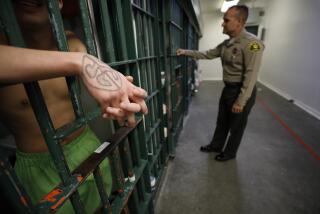Detainees’ day in court
Virtually the first order of business for Barack Obama after his inauguration was a series of executive orders aimed at closing the detention center at Guantanamo Bay within a year and providing for a fair disposition of charges against the remaining detainees there. His break with Bush administration policies garnered extravagant -- and premature -- praise. Thanks to presidential procrastination and congressional resistance, Atty. Gen. Eric H. Holder Jr. recently said that the Jan. 22 deadline “will be difficult to meet.”
We firmly hope he’s wrong, and several developments in the last few days suggest that he may be. Most important is a shift of opinion in Congress. In May, the Senate voted 90 to 6 to block the transfer of detainees to the United States and denied the administration $81 million it had requested to close Guantanamo. Last week, however, the Senate approved and sent to Obama a budget measure that allows the government to continue transferring detainees here as long as it develops new guidelines and provides 15 days’ notice before a prisoner is moved.
That legislation will make it easier to close the now infamous detention center, where the population has dwindled from nearly 800 to 220, 75 of whom have been cleared for release. But it won’t resolve the question of whether the remaining detainees will be tried in federal court, as they ought to be, or before military commissions. Nor does it clarify what Obama plans to do with detainees he says “cannot be prosecuted yet who pose a clear danger to the American people.” As we have said before, indefinite detention is repugnant to the U.S. legal tradition and should be a last resort.
George W. Bush discovered that when Congress and the executive branch give short shrift to the rights of detainees, the courts will intervene. Last week, the Supreme Court agreed to decide whether a judge had the authority to order the release in the U.S. of 14 Uighurs, Chinese Muslims who were wrongly held at Guantanamo and who fear persecution if they are sent home. The Obama administration opposes giving courts authority over what it sees as immigration decisions. So why not render the case moot by treating the Uighurs as political refugees?
The legal axiom that “justice delayed is justice denied” applies with special force to Guantanamo. Whether they are dangerous terrorists or, like many of those already released, bystanders caught up in a post-9/11 dragnet, these detainees have languished for years without adequate due process. Obama should abide by his deadline for closing Guantanamo and bring the same urgency to guaranteeing that the relocated detainees have their day in court.
More to Read
Get the L.A. Times Politics newsletter
Deeply reported insights into legislation, politics and policy from Sacramento, Washington and beyond. In your inbox three times per week.
You may occasionally receive promotional content from the Los Angeles Times.










